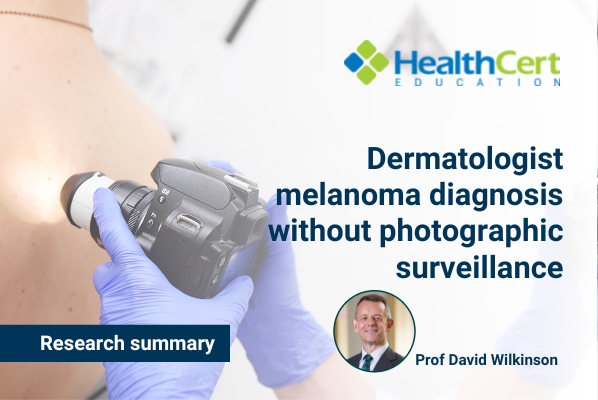Webinar: Addressing acne, psoriasis & eczema in primary care
In this webinar in collaboration with the RACGP, Dr Dianne King provides a review of how to address acne, psoriasis, and eczema in primary care.
.jpg)
HealthCert Education
In this webinar (delivered with the RACGP) Dr Dianne King provides a review of how to address acne, psoriasis, and eczema in primary care.
For further information on this topic, you may be interested to learn more about HealthCert's Professional Diploma program in General Dermatology.
In the full recording below, specialist GP Dr Dianne King shares her knowledge and experience to equip GPs with a practical approach on how to identify and treat these common conditions, and when to refer confidently and practically, with real patient cases and FAQs.
This webinar covers:
- How to identify common dermatological conditions and their presentation in primary care.
- How to identify and treat acne, psoriasis, and eczema.
- When to refer patients with acne, psoriasis, and eczema.
Dr King's answers to your most commonly asked questions are also included below.
Watch the full webinar recording now:
For further information on this topic, you may be interested to learn more about HealthCert's Professional Diploma program in General Dermatology.
Your FAQs answered by Dr Dianne King
Here are the questions most commonly asked during the webinar, with answers provided by Dr Dianne King.
Can a GP initiate systemic methotrexate for severe psoriasis? When to stop methotrexate if new elevated LFTs under treatment for psoriasis?
Yes, a GP can initiate methotrexate for psoriasis, just make sure the patient is clear that it is a once weekly treatment and to keep monitoring LFTS/ U’s and E’s every 3 months whilst on it. Stop methotrexate if LFTS become elevated and leave off for a month before starting a biologic.
Does psoriasis always happen symmetrically on both sides of body? For example, both elbows/knees?
Psoriasis does not always have to be symmetrical, but commonly is.
How do we advise to apply the Enstilar? How many times a day and for how long?
Enstilar foam is applied once daily for around 2-3 months until the plaques start to thin.
I have a patient with PCOS on implant with acne. What medication would be effective to treat her acne? Spironolactone?
If a patient with PCOS is getting acne on Implanon, I would check with her normal GP whether there is an alternative contraceptive and whether the Implanon could be removed, as both Mirena and Implanon can exacerbate acne in PCOS patients.
How to manage back acne? And when do you suspect yeast folliculitis?
For back acne I use Aklief foam, phototherapy LED and oral antibiotics. Folliculitis tends to have micro-pustules under dermatoscope rather than tender large papules. A swab is always useful in this case.
Most patients ask which OTC facial products to use for cleansing. Is there anything that you could kindly suggest please?
For cleansers, use brands such as Cerave, La Roche Posay Effaclar, and Cetaphil. All are good.
Are topical retinoids suitable for adolescents? If yes, what is the minimum age?
Use Retrieve or Stieva cream to start on the face. Differin gel in extremely greasy skin. Usually start from age 10 and up.
Retrieve, can it be applied over the acne?
Retrieve is applied to the whole face, not just the acne spots alone.
Dose for doxycycline for acne can be up to 200mg daily?
Doxycycline dose can be up to 200 mg daily, but I rarely use it for acne as I use LED and it is a photosensitive antibiotic.
Is the topical retinoid teratogenic?
Topical retinoids are unlikely to be an issue regarding teratogenicity as they would not be sufficiently absorbed, but I would not persist in using them if the patient were to fall pregnant.
For acne scars, which topical retinoids and dose do you use?
Acne scars are best treated with a dermaroller, topical Retrieve and other physical modalities such as Dermapen or radiofrequency devices/laser.
How can you differentiate eczema in flexures from scabies if it has developed recently?
You can differentiate flexural eczema from scabies by using a dermatoscope and looking for evidence of the mite.
Do you treat the lichenified skin of eczema that isn't currently red/inflamed?
If the skin is lichenified, I would still treat with a topical steroid ointment for a period of 2 weeks (under occlusion preferably) even if not red or inflamed.
Can we apply steroids for eczema onto broken skin surfaces that are wounds? A lot of kids and adults present with broken skin surfaces that have been scratched and treated by previous GPs with steroid onto the open wound.
Ok to prescribe steroid ointment to broken skin but warn them it will sting for the first 2 days.
What is the best approach for severe acne in 11 year old girl? Will she respond to topical treatments?
OCP to control acne can be started after 12, but ensure that the girl had reached her full height potential first.
How long can we give trimethoprim for acne?
I generally prescribe trimethoprim in conjunction with LED therapy for a period of 6-12 weeks, then wean it off.
When would you choose erythromycin vs trimethoprim?
I usually start with erythromycin first. If not responding after 6 weeks, switch to trimethoprim.
What to do if a person visits with severe acne and has already done a course of Isotretoinoin?
If a person with severe acne has previously had a course of isotretinoin, you could offer them LED phototherapy in conjunction with oral antibiotics (or try Kleresca photobionics gel).
What are your thoughts on adding topical Fucidin to steroid with eczema?
I do not tend to add Fucidin (or any topical antibacterial) to steroids for eczema, but prefer to treat with two weeks oral Keflex.
Engaging with this blog can help meet your annual
|

How to claim your CPD hours
|
Watch another webinar recording: Primary care management of rosacea

 1800 867 1390
1800 867 1390.jpg)
.jpg)




